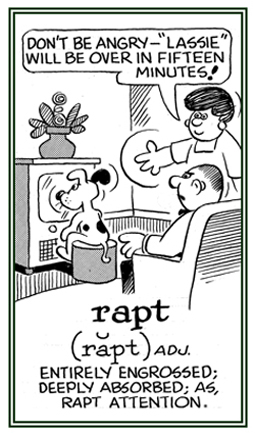rap-, rav-
(Latin: tearing away, seizing, swift, rapid; snatch away, seize, carry off; from Latin rapere, "to seize by force and to carry off")
2. The part of a river where the current moves faster than the common current: The rapids in the river were filled with large boulders and Eric and Stuart decided to portage around them by carrying their boat and supplies overland.
A rapids is a section of a river where it loses elevation or height over a relatively short distance and the stream goes down steeply causing an increase in water flow and turbulence.
2. The act of despoiling (plundering valuables) by force of a country during warfare: Some of the rapines of villages has been described in the writings of historical authors of those times.
3. Etymologically: from Middle English, from Old French, from Latin rapna, from rapere, "to seize, to take".
The newspapers reported on a gang of rapists who were terrorizing the city.
2. Relating to showing or suggesting deep emotions of joy or ecstasy and joy: Tina's father had rapt pleasure as his daughter was singing in the musical presentation.
Harry's rapt expression reflected the pleasure he felt while he was listening to the marvelous music on TV.
3. Conveying a deeply engrossing or absorbing situation: The students gave the teacher their rapt attention as she told them about the trip that the class would be taking.The children sat as rapt listeners while the storyteller was reading the story about the fairies.
4. Characteristic of showing or proceeding with great happiness or excitement: Marjory's mother expressed her rapt pleasure when she came to visit with her children.Cindy stood in front of the famous painting with a rapt smile on her face.
5. A reference to being carried off spiritually to another place, sphere of existence, etc.: As David was near death, he looked forward to the rapt day when he would be taken from this world into heaven.6. Etymology: from Latin raptus, past participle of rapere, "to seize, to snatch".
The figurative sense is from the notion of "being carried up into Heaven (bodily or in a dream)", as in a saint's vision.


Go to this Word A Day Revisited Index
so you can see more of Mickey Bach's cartoons.
These raptors are just a few of the numerous carnivorous birds that hunt and kill other animals for food.
2. Relating to those animals that are adapted for seizing prey with their talons and beaks: The hawk has special raptorial claws on its feet for snatching birds while they are flying in the sky.
2. Utterances or expressions of appreciation and rejoicing: The critics went into raptures about the performance of the musician.
3. The carrying of a person to another place or a better sphere of existence: There are some religious leaders who preach the coming of a rapture which many of the faithful believe.
4. In theology, the experiences, anticipated by some fundamentalist Christians, of meeting Christ midway in the air upon His return to earth: The spirituality of the woman was seen in her face as she prayed that she would see the rapture of her Lord.
Some historical artists depicted the raptures of saints in their allegorical paintings that have underlying meanings as well as literal ones.
5. A feeling of great happiness, pleasure, or love: William and Elizabeth listened with rapture as their twelve-year old girl sang a solo during the school musical.2. The transporting of a person from one place to another; especially, to heaven: The belief that, in the "last days", Christians will be raptured from the earth before the final tribulation.
Rapture originally meant being caught up in an emotional state, typically involuntary and uncontrollable; however, now, it simply means "great joy" or "ecstasy".
2. Full of, feeling, or manifesting ecstatic joy or delight: The rapturous critic of the concert left no doubt in the reader’s mind as to the future of the pianist.
3. Characterized by, attended with, or expressive of great joy and happiness: The politician's speech was given rapturous reviews by the press.


Go to this Word A Day Revisited Index
so you can see more of Mickey Bach's cartoons.
2. A description of extreme pleasure and happiness or excitement: The Johnson family rapturously described their vacation trip to Alaska.
2. A state or experience of being carried away by overwhelming emotion: Lorna was full of rapturousness when her boyfriend asked her to marry him and he gave her a beautiful engagement ring.
3. A mystical experience in which the spirit is exalted to a knowledge of divine things: Standing on the hillside, Carolyn had a sense of rapturousness, something close to an ecstatic revelation.
4. The final assumption of Christians into heaven during the end-time according to a certain Christian theology: Many believe that the final rapturousness may be accompanied by bright skies and choirs of angels.
2. To pillage; to sack: The enemy soldiers ravaged the village, looting and plundering along the way.
3. The act or practice of pillaging, destroying, or devastating: The rioters got out of control and started ravaging the stores in the shopping center.
Adam's body showed the ravages of years of hard times.


